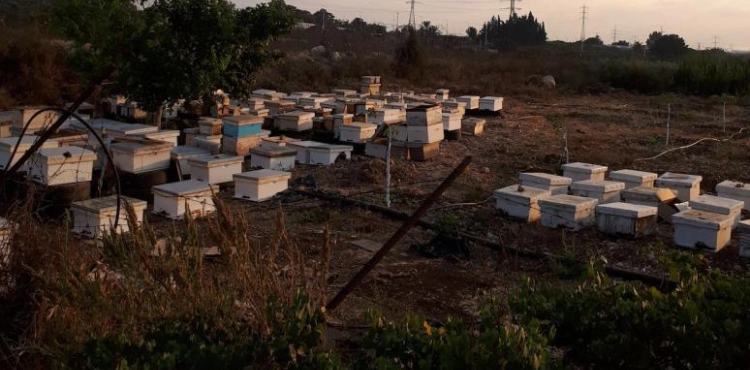The beehives in Qalqilya city have not been spared the violations of the occupation. They have a share of tear gas canisters that the soldiers fire at the youths in order to keep them away from the apartheid wall and security fences in the place.
The farmer, Muhammad Qawwas, from Qalqilya, 57, places a number of beehives on his land at a distance of zero with the Apartheid Wall near the gate of the old Habla road south of Qalqilya. These cells are targeted by tear gas and sound bombs as well and cause great damage to the existing cells.
Farmer Muhammad Kawas says: "These cells located in the place chose their place to be the distance with the areas behind the wall and the 48 areas close to the bees, so there are no longer areas in Qalqilya where the beehives will be, and from a scientific point of view the daily bee journey back and forth three kilometers, and thus you can The bee near the wall to go inside the Palestinian place for a distance of more than a kilo and a half and more, then return with food from seedlings and nurseries in the region. "
And he continues, "However, these cells are constantly exposed to firing gas and sound bombs together recently by the patrols that are behind the wall and the security fence and launching bombs and rubber and metal and live bullets, and beehives have a share of these dangerous bombs on cells that do not bear gas. Tear and sound bombs causing fires in the place. "
The farmer Al-Kawas recalls the situation before the wall, and how the hives were hovering around the areas in income and mountainous areas, and he says: "Before the wall was built, the number of palm cells was in the tens of thousands. Today, however, there are no more than three thousand cells in Qalqilya Governorate, most of which are exposed to direct and indirect occupation violations."
The farmer Kawas returns to the conversation saying: “The nature of the tear gas has a strong impact on the respiratory system of a person, so how about beehives, for the gas to reach the cell means the death of what is inside it and the escape of the remainder of the cell, and here the loss lies in death and flight, and there is no other place to transfer this to Cells, the alternative place is rural areas, but the settlers stand for these cells by burning or destroying them and spraying pesticides on them. "
Agricultural engineer Ahmed Abu Shehab said: "Beehives are targeted because they are in remote areas, and there is an ease for targeting them by the occupation and settlers, so the farmer goes to areas near the housing areas and chooses the site to spread these cells, and these places do not enable the cell to produce honey, So the numbers of cells in the West Bank areas are less than they were before. "












